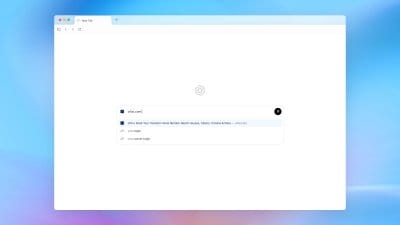OpenAI's Atlas: More AI Platform, Less Web Browser – A ChatGPT-Centric Revolution
By: @devadigax

OpenAI, the trailblazing force behind ChatGPT, appears to be making a strategic pivot with its rumored new browser, "Atlas." While the term "browser" typically evokes images of navigating webpages, the emerging consensus suggests Atlas is far more ambitious: a dedicated conduit for distributing ChatGPT and developing new AI features, rather than merely improving the core web browsing experience. This subtle yet profound distinction could redefine how we interact with the internet, marking a significant shift from a document-centric web to an AI-agent-centric digital landscape.
For years, the internet has been a collection of pages, linked together, accessed through a browser designed to render those pages. Search engines helped us find them, but the interaction largely remained passive consumption. OpenAI's Atlas, however, seems poised to challenge this paradigm. Instead of building a better vehicle for existing web content, Atlas is envisioned as a foundational layer where ChatGPT and other advanced AI models are not just add-ons but integral to the entire user journey. This move signals OpenAI's intent to control not just the AI models themselves, but also the primary interface through which users engage with them on the vast expanse of the web.
The "why" behind this strategy is multifaceted. First and foremost, it's about control and direct access. Relying on third-party browsers like Chrome, Edge, or Safari to integrate ChatGPT means OpenAI is always subject to their rules, their update cycles, and their design philosophies. A proprietary browser gives OpenAI an unparalleled sandbox to experiment, innovate, and deploy AI features without external gatekeepers. This direct channel allows for rapid iteration and ensures that the user experience is precisely as OpenAI intends it to be, deeply interwoven with their AI capabilities.
Secondly, it's a strategic move to solidify ChatGPT's market position. While ChatGPT has gained immense popularity, its current primary access points are dedicated web interfaces or APIs integrated into other applications. A browser like Atlas could make ChatGPT an omnipresent, proactive assistant, embedded in every facet of a user's web interaction. Imagine a browser that doesn't just display a webpage but instantly summarizes it, answers questions about its content, drafts responses in a forum, or even generates creative content directly within any text field – all powered by a deeply integrated ChatGPT. This isn't just a browser with an AI button; it's a browser *built around* AI.
From a technical standpoint, Atlas could offer a seamless, deeply contextual AI experience that current browser extensions or separate applications struggle to achieve. Existing AI integrations often feel like overlays or separate tools. An AI-first browser, however, could be designed from the ground up to understand the user's intent, the content they are viewing, and the tasks they are performing, offering truly proactive and intelligent assistance. This could manifest as AI-powered search that goes beyond keywords to understand conversational queries, intelligent content curation, automated task completion, and even personalized web experiences that adapt
For years, the internet has been a collection of pages, linked together, accessed through a browser designed to render those pages. Search engines helped us find them, but the interaction largely remained passive consumption. OpenAI's Atlas, however, seems poised to challenge this paradigm. Instead of building a better vehicle for existing web content, Atlas is envisioned as a foundational layer where ChatGPT and other advanced AI models are not just add-ons but integral to the entire user journey. This move signals OpenAI's intent to control not just the AI models themselves, but also the primary interface through which users engage with them on the vast expanse of the web.
The "why" behind this strategy is multifaceted. First and foremost, it's about control and direct access. Relying on third-party browsers like Chrome, Edge, or Safari to integrate ChatGPT means OpenAI is always subject to their rules, their update cycles, and their design philosophies. A proprietary browser gives OpenAI an unparalleled sandbox to experiment, innovate, and deploy AI features without external gatekeepers. This direct channel allows for rapid iteration and ensures that the user experience is precisely as OpenAI intends it to be, deeply interwoven with their AI capabilities.
Secondly, it's a strategic move to solidify ChatGPT's market position. While ChatGPT has gained immense popularity, its current primary access points are dedicated web interfaces or APIs integrated into other applications. A browser like Atlas could make ChatGPT an omnipresent, proactive assistant, embedded in every facet of a user's web interaction. Imagine a browser that doesn't just display a webpage but instantly summarizes it, answers questions about its content, drafts responses in a forum, or even generates creative content directly within any text field – all powered by a deeply integrated ChatGPT. This isn't just a browser with an AI button; it's a browser *built around* AI.
From a technical standpoint, Atlas could offer a seamless, deeply contextual AI experience that current browser extensions or separate applications struggle to achieve. Existing AI integrations often feel like overlays or separate tools. An AI-first browser, however, could be designed from the ground up to understand the user's intent, the content they are viewing, and the tasks they are performing, offering truly proactive and intelligent assistance. This could manifest as AI-powered search that goes beyond keywords to understand conversational queries, intelligent content curation, automated task completion, and even personalized web experiences that adapt
 AI Tool Buzz
AI Tool Buzz